- Home
- J. T. Edson
Apache Rampage
Apache Rampage Read online
APACHE RAMPAGE
JT
EDSON
‘BRAVE UP, BROTHERS!’
Lobo Colorado’s booming shout rang out over every other sound. ‘This is a good day to die!’
It was a shout which carried to the men on the edge of town. Zeke spoke Apache, and the words brought the hair standing bristly and stiff along the back of his neck.
It was a shout no self-respecting Apache brave could resist. Not when their great war chief was hurling his horse down the slope towards them. The braves sent their horses leaping forward, charging down the slope to count coup, to loot, to kill.
APACHE RAMPAGE
They made an ill-assorted crowd. The pious citizens of Baptist’s Hollow. Major Ellwood, mayor and town marshal. Doc Thornett’s medicine show, with Madame Fiona, woman bare-knuckle boxer, her daughters, and Elwin, the boy who wanted to be a juggler. Sergeant Magoon, the wild Irish soldier who had brought his men. Chet Bronson and Harris, going to the Stockade for life. Big Em, the female fist-fighting champion of Fort Owen. The miners driven from the hills by Lobo Colorado’s Apache warriors.
There were four Texans also. Three were tall, eye-catching men. Yet when the chips were down and a leader was needed they called on the fourth Texan — a small insignificant, soft talking man. His name was Dusty Fog.
APACHE RAMPAGE
A CORGI BOOK 552 08282 1
Originally published in Great Britain by
Brown, Watson Ltd.
PRINTING HISTORY
Brown, Watson Edition published 1963
Brown, Watson Edition reprinted 1966
Corgi Edition published 1969
Corgi Edition reprinted 1972
Corgi Edition reprinted 1978
Copyright © 1963, 1966 by Brown, Watson Ltd.
Copyright © 1969 by Transworld Publishers Ltd.
Conditions of Sale
1. This book is sold subject to the condition that it shall not, by way of trade or otherwise, be lent, re-sold, hired out or otherwise circulated without the publisher’s prior consent in any form of binding or cover other than that in which it is published and without a similar condition including this condition being imposed on the subsequent purchaser.
2. This book is sold subject to the Standard Conditions of Sale of Net Books and may not be re-sold in the U.K. below the net price fixed by the publishers for the book.
This book is set in Times 10/11 pt.
Corgi Books are published by Transworld Publishers Ltd.,
Century House, 61—63 Uxbridge Road, Ealing, London, W5 5SA
Made and printed in Great Britain by
Richard Clay (The Chaucer Press), Ltd., Bungay, Suffolk
APACHE RAMPAGE
CHAPTER ONE
MEDICINE SHOW
The wagon showed up like a black sheep on a snow-bank against the dull greys, browns and greens of the Dragoon Mountains. Originally it had been one of the big, four-horse, covered wagons which made the great cross-continental trails, taking travellers from the East to California. Instead of the canvas-covered top the sides were now made of wood, squarely built. The right side was made in two pieces, the outer of stout wood, serving as a stage, for this was a medicine show wagon. On the false side and the real sides, in glaring red, gold-edged letters, against the yellow of the wood, was emblazoned a message to the world.
‘DOCTOR ERAZMUS K. THORNETTS SUPERIOR
ELIXIR PRESENTS
MADAM FIONA . . . . World’s Strongest Woman
THE MASKED MARKSWOMAN . . . . With Her Rifles
MAGDALENE AND SHARON . . . . . . Acrobats
Janice . . . . . With Songs You Love To Hear
Rosemary . . . . Graceful, Artistic Dancing’
With its red-spoked wheels to augment the other colours the wagon made quite a vivid splash in the foothills of the Dragoon Mountains. It was no more or less garish-looking than any other medicine show and offered a better selection of entertainment than most. The owner of the show, Doctor Erazmus K. Thornett presented an air of sober respectability to the wagon. It was an air which never really deserted him, not even while out on the trail, wearing an old, collarless shirt and trousers.
In town, dressed in his stylish, though just a little old-fashioned, black cutaway coat, fancy vest and elegant white trousers, he oozed respectability and confidence. His rather pompous, sun-reddened face and white hair helped his appearance. Even the fact that he always carried a Merwin and Hulbert army pocket revolver in a shoulder holster, did nothing to detract from his appearance. Rather it gave him an added touch of respectability and poise, a kind of dignity. It showed him as a gentleman who must be prepared to defend his life, property and honour in a hard land.
Taken all in all it would have come as a shock to many people that this elegant, learned-looking and educated-talking man was not a qualified doctor and never even attended any formal school of medicine. That did not make Doc Thornett a complete quack for he’d been thoroughly taught in the medicine show arts by a doctor who was struck from the rolls. Thornett could diagnose most ills which came his way and knew the best cures for all of them. He was an acknowledged expert at setting bones and removing bullets, two of the Western doctors’ most common duties. He also pulled teeth with as little pain as possible, and there were several children who came into the world aided by his skilled attention.
So, even though his Superior Elixir was not the omnipotent cure-all he claimed it to be, he himself served a useful purpose. His medicine was harmless, did not taste bad, his show entertained and most folks thought they were getting their money’s worth out of both. In the West there were few doctors, and at times Thornett served a very useful purpose, for he travelled to small villages where regular doctors but rarely came.
‘We’re headed for the wrong place this time, Doc,’ said the woman who sat by Thornett’s side on the wagon box.
‘And why, Phyllis me dove?’
Phyllis Lanley was anything but dove-like in appearance. She was a good-looking woman in her late thirties, middle-sized and stockily built. There was a tanned, healthy, happy air about her and her body, although plump looking, was hard and firm fleshed without any fat. Her red hair still was its own colour and untouched by any aids against the greying of time, her skin was losing the youthful texture but not much. She wore an old shirtwaist which was strained by her swelling bust, her old jeans were tight at her hips, her arms and feet bare. The arms were strong looking, and hard muscles rolled under the skin, for she was Madam Fiona, the strong woman. Naturally strong, judicious fakery helped Phyllis to appear even stronger when she did her act. Her four daughters were the rest of the cast. They were in the back of the wagon and dressed in the same way as their mother.
Three of the girls leaned on the back of the wagon box, looking over Phyllis and Thornett’s shoulders. Molly, the oldest girl was at the right. She was a plump red-haired girl, pretty and talented. She was the Masked Markswoman and Magdalene of the acrobatic act, good at both and a possible successor to her mother’s crowd-drawing act. In the centre was Patty, red-haired, pretty, hot-tempered and slim; she appeared as Sharon and was a skilled contortionist. Rosemary, or Rosie as she was always called by the others, stood at the left. She was a slim, good-looking blonde, pleasant, a good dancer, but by far the most naïve of the girls.
The last of the girls, Rosie’s twin sister, Janice, was inside the wagon. She sat on the lid of a box which contained the troupe’s costumes, reading the words of a new song. Janice was blonde, plump and the best-looking of the girls. She was also the most house-proud. It was Janice who, besides her singing, took care of the affairs of the troupe. The others helped with the chores but Janice was the only one who gave any thought to the state of the food supply, or the purchasing an
d repair of clothing. Her voice was very good, and Thornett hoped one day to get her on the legitimate stage.
The towns the show played were rough, raw, rugged and proud of the boast that they’d never been curried below the knees. The men were fighters, the saloon girls and poorer townswomen, proud of their ability in a hair-yanking battle. So Phyllis became a bare-knuckle boxer and later added the claim that she was Champion of the World. A strong woman’s act was an open challenge to the rough girls of the towns, and Phyllis learned to look after herself.
Even though he would rather not have been going for the fight, Thornett was not sorry to leave Tucson behind. The town was too big and civilised these days. A town with two resident doctors and a dentist was of no use to Thornett, for people tended to go to them rather than to him. Out at Fort Owen it would be different; the soldiers were cut off from civilization and would welcome a visit from the show. It was more. than likely they would want to bet on their challenger, so Thornett was planning to make a stop at Baptist’s Hollow and raise some extra cash.
The wagon, pulled by the four big, matched black horses, was following the main stage-coach route. Route was a grandiloquent name for the scar left by the wheels of many vehicles. It followed the smoothest, easiest route, one once used by Apache war parties and there were few better natural surveyors of land than the Apache. On either side rolled off barren land, marred by stinkwood, cholla, cactus and prickly pear. Even the sparse grass looked yellowish and unpalatable to animals. All in all the landscape looked what it was, a hard, harsh, raw land. Until only a couple or so years ago it was the roaming land of the Apache nation.
Looking around her Phyllis felt a dislike for the land. There was none of the rich, lush green of the Texas cattle country or the orderly neatness of the farm lands of the Mississippi. This country was harsh and unpleasant compared with either of them. For all that Phyllis would rather be out here than in the town of Baptist’s Hollow.
‘Let’s just collect supplies, Doc,’ she suggested. ‘We needn’t take the wagon in. Janice and I can walk in and bring out all we’ll need to get us to Fort Owen without taking the wagon.’
‘Most certainly not, me dear. Our good friends, Sergeants Magoon and Tolitski, will have money to wager on your fistic encounter and we can always use money. Can we not?’ Thornett said pompously, beaming at Phyllis. ‘The more we wager the more we will win, without the risk of coming too close to the proverbial blanket in the inconceivable event of your losing the pending bout of fisticuffs. True, money does little or nothing to purchase happiness, yet it goes far to allowing one to be miserable in comfort.’
Phyllis laughed as she heard Thornett once more expressing his views on the subject of money. She knew it was no use trying to dissuade him once his mind was made up. Yet Phyllis did not relish the idea of going into the hostile town, for hostile she knew it would be. There’d been other hostile towns in their travels, they’d been won over by Thornett’s eloquence or the show. This town was different, it wanted no part of them and would treat them as undesirable aliens.
CHAPTER TWO
BAPTIST’S HOLLOW
The town lay in the steep sided protection of a U-shaped draw, back from the main stage trail. Access to the town by wagon or stage-coach was only possible through the open end of the U, the sides being too steep-sloped even for a man to ride a horse down. From the main stage route the trail branched down and at the city limits became Church Street, main and only thoroughfare of the town. Along Church Street has most of the town’s business section; stores, the one saloon, the town court offices which also housed the Marshal’s office and jail, the Wells Fargo depot and the telegraph office. The Wells Fargo office was the sole reason for the town being here at all. It served as the main relay point for the stage-coaches.
There were few people on the street as the garish-looking medicine show wagon entered the town. Phyllis watched the few who were on the street, noting the disapproval on their faces. The men all seemed to be wearing sober black suits and low crowned black hats. The women were dressed in black frocks which hid any sign of womanhood. On every face was a look of miserable piety which would have warned off a more sensitive man than Thornett.
Looking around him, Thornett was supremely confident that the people would thaw out when they saw the show. It was all good, clean fun, but for all that he was pleased he’d remembered to warn Rosie to cut out her rather risque can-can for this one show. He knew his persuasive tongue well and was sure he could soothe the most disapproving crowd. For all that he was startled by the scowls which greeted his warm and friendly hat-raising.
‘Doc! Hey, Doc Thornett!’
The voice brought them to a halt outside the town court-house. At a barred window of the jail Thornett saw two familiar faces. One was a cheery, sun—or whisky—reddened face with twinkling brown eyes. The other was a thinner set of features, rather vacant and dreamy-looking. He recognised them both, and although it did not surprise him to see them framed by a set of bars, he was surprised to find them jailed in so small a town.
Always polite, Thornett raised his hat in a friendly greeting. ‘Good morning to you, Scully old friend. How are you today, and you, Willy?’
‘Howdy, Doc, Miz Phyllis,’ replied the simple-looking, tow-headed, younger face, beaming delightedly. ‘Ain’t seed you all in a coon’s age.’
Thornett was curious, though not unduly worried at seeing Scully and Willy in jail. They were a pair of confidence tricksters who made their living selling gold bricks, fortune telling and otherwise extracting money from the gullible. Scully was a brash, jovial, fast-talking man who always dressed well, and ran the team. Willy was a gangling, raw-boned young man who looked like a half-wit and talked with a slow southern drawl. His talk and appearance acted as a blind, for Willy was far from being the fool he looked. When needed he was far from slow, could swing a punch like a Missouri mule’s kick and fight like a tiger. His big, awkward-looking hands were capable of delicate manipulations with a deck of cards. Not only could he deal the second or bottom card with ease, but he was a master of the most difficult move in the cheater’s repertoire. He could remove a desired card from the centre of the deck without being detected. It was his general slow appearance which acted as a cover when his talents were being put to use.
‘How do you come to be incarcerated in this small and undeveloped town?’ Thornett asked, although he could guess.
Scully sounded more indignant than distressed at his plight. ‘Like this, Doc. I thought the rubes here would go for the Old John Conquer Root and was just starting to tell them how it cures all ills, makes child-birth easy and restored vitality to men, when the great seizer arrived. You know I abhor violence, especially when there’s a ten-gauge lined on me. So we came along quietly. We’re in jail for offending public morals and for vagrancy. What’s more, that sick marshal won’t take a bribe.’ From Scully’s tone this was the supreme indignity of all. ‘Imagine that, a hick town marshal who can’t be making more than thirty dollars a month clear, tossing me in the hoosegow and refusing to accept a bribe. Why, I’ve bribed such exponents of the badge as Wyatt Earp, Wild William Hickok and Jim Courtright in my time, always doing it in such a way as to give no offence. And this hick refuses to accept one. More, he says he’ll hold me for attempting to bribe an official if I try it again.’
‘Hard luck, Scully,’ said Phyllis, smiling now she knew the jailing was not on a serious charge.
Scully nodded his thanks to Phyllis. He’d known Thornett’s show for several years and early on made an attempt on Phyllis’s virtue. Her refusal and his failure made him respect her all the more. He gave a warning to his friends:
‘I wouldn’t show here, was I you, Doc. Not unless you and the girls want to join me here. And I warn you the food’s terrible. This town’s no good.’
‘Thanks for the warning, old friend,’ replied Thornett. ‘Do you have sufficiency of the wherewithal to purchase your release, to whit, by payment of your fine?’
/>
‘Sure, we’ll get by, thanks,’ answered Scully. He knew Thornett would make the offer and was grateful, but he would never take money from a good friend when he did not need it. ‘You get out of here while you can.’
Thornett started the wagon forward again, seeing the ‘I told you so’ look on Phyllis’s face. He was not unduly worried by Scully’s warning, even though the conversation did not go unnoticed by the watching people. Scully was a confidence trickster. His entire way of business was different from Thornett’s. The medicine show gave folks a good entertainment for their money and made no attempt to cheat them.
There was no way the wagon could turn in the street. Even the stage-coaches were compelled to enter the plaza to make a turn. So Thornett drove on, sublimely unconscious of the angry looks and morose mutterings of the gathering people. He knew they were following the wagon and thought they were coming to see his show. Phyllis and the girls saw the crowd following and did not feel so happy about it. The girls stood at the rear of the wagon, looking through the window in the door. Molly turned and loaded both her rifles. She’d seen too many hostile crowds not to see the signs. There was no enthusiasm or interest in those miserable-looking faces, only cold dislike and disapproval.
Bringing his wagon into the plaza, Thornett beamed in delight. The place was almost made for his show. He brought the team around and halted them on the far side in front of the church. Jumping down, he expected the girls to come and help him get ready. Usually Phyllis and Molly lowered the stage while Patty fixed on the supports for it and the younger girls started to ready the equipment for the show. Not one of the women moved. Phyllis sat on the wagon box and watched the people who were now crossing the plaza, standing well clear of the wagon, to watch every move the show people made.

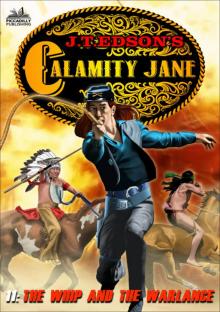 Calamity Jane 11
Calamity Jane 11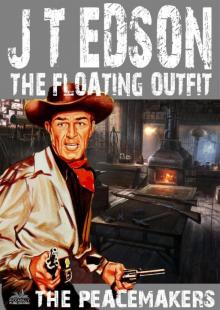 The Floating Outift 33
The Floating Outift 33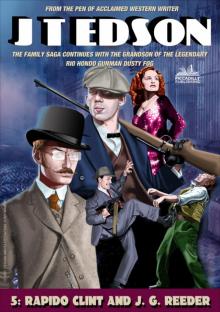 Cap Fog 5
Cap Fog 5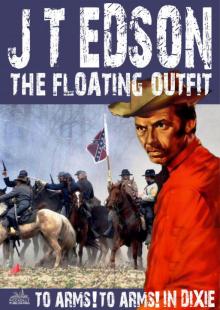 The Floating Outfit 34
The Floating Outfit 34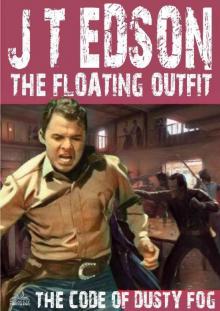 The Code of Dusty Fog
The Code of Dusty Fog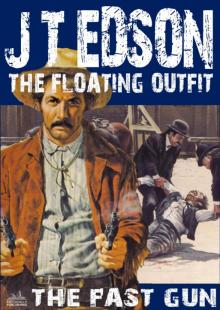 The Floating Outfit 21
The Floating Outfit 21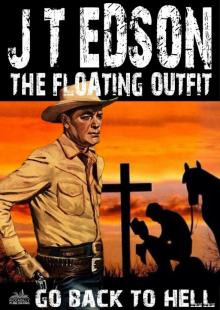 The Floating Outift 36
The Floating Outift 36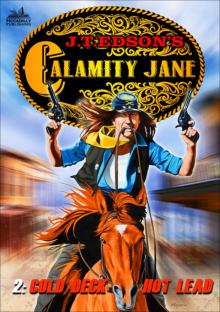 Calamity Jane 2
Calamity Jane 2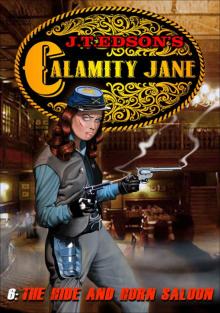 Calamity Jane 6: The Hide and Horn Saloon (A Calamity Jane Western)
Calamity Jane 6: The Hide and Horn Saloon (A Calamity Jane Western)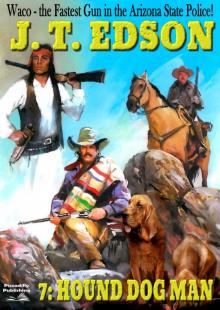 Waco 7
Waco 7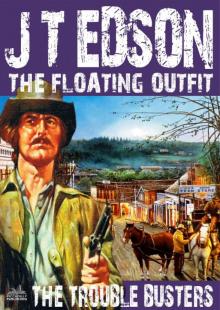 The Floating Outfit 25
The Floating Outfit 25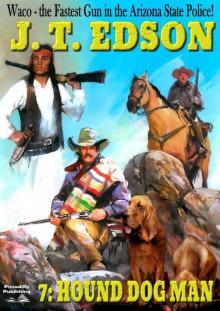 Waco 7: Hound Dog Man (A Waco Western)
Waco 7: Hound Dog Man (A Waco Western)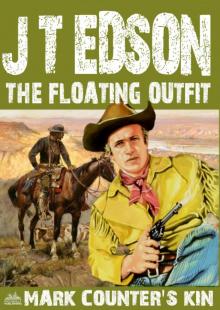 The Floating Outfit 47
The Floating Outfit 47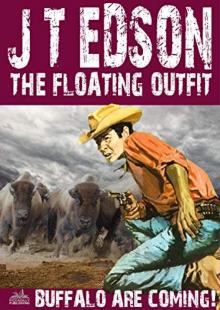 The Floating Outfit 42: Buffalo Are Coming!
The Floating Outfit 42: Buffalo Are Coming!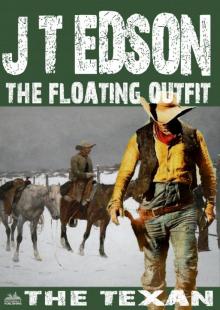 The Floating Outfit 46
The Floating Outfit 46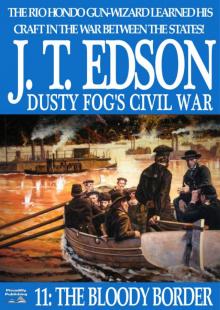 Dusty Fog's Civil War 11
Dusty Fog's Civil War 11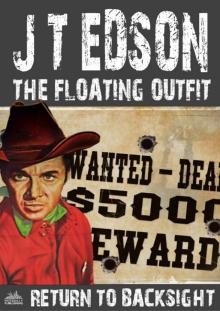 The Floating Outfit 61
The Floating Outfit 61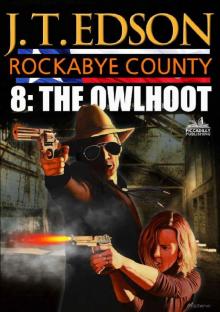 The Owlhoot
The Owlhoot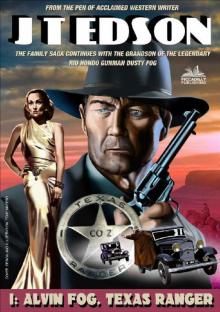 Alvin Fog, Texas Ranger
Alvin Fog, Texas Ranger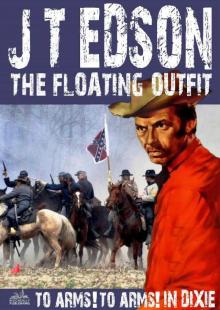 The Floating Outfit 34: To Arms! To Arms! In Dixie! (A Floating Outfit Western)
The Floating Outfit 34: To Arms! To Arms! In Dixie! (A Floating Outfit Western)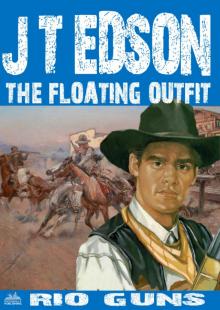 The Floating Outfit 44
The Floating Outfit 44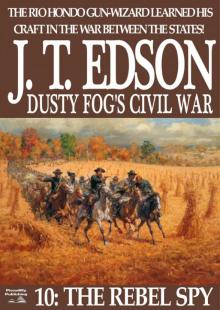 Dusty Fog's Civil War 10
Dusty Fog's Civil War 10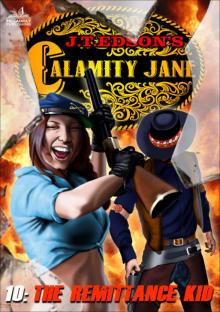 Calamity Jane 10
Calamity Jane 10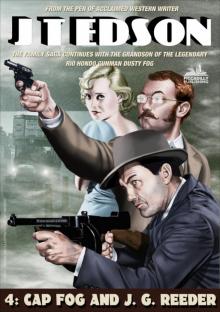 Cap Fog 4
Cap Fog 4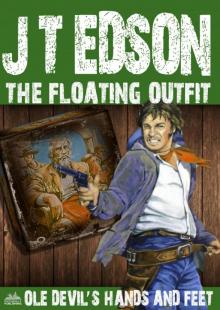 The Floating Outfit 51
The Floating Outfit 51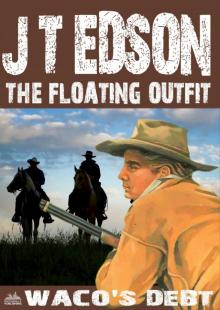 The Floating Outfit 50
The Floating Outfit 50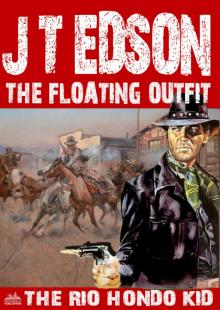 The Floating Outfit 49
The Floating Outfit 49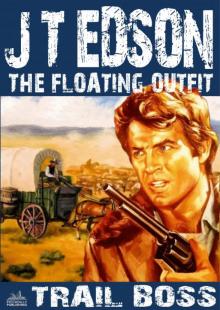 The Floating Outfit 10
The Floating Outfit 10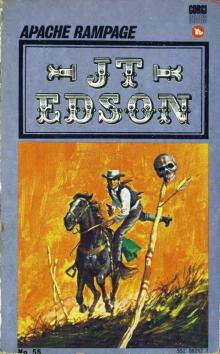 Apache Rampage
Apache Rampage The Floating Outfit 15
The Floating Outfit 15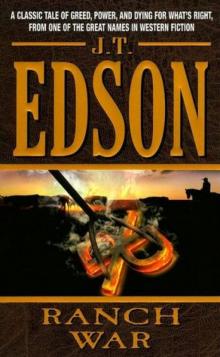 Ranch War
Ranch War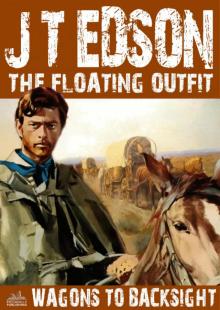 The Floating Outfit 11
The Floating Outfit 11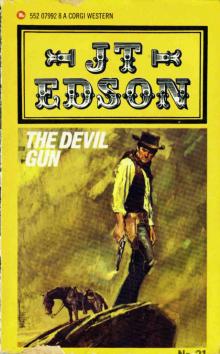 The Devil Gun
The Devil Gun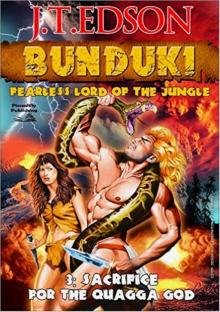 Sacrifice for the Quagga God (A Bunduki Jungle Adventure Book 3)
Sacrifice for the Quagga God (A Bunduki Jungle Adventure Book 3)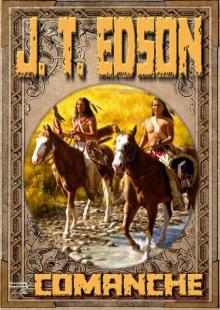 Comanche (A J.T. Edson Western Book 1)
Comanche (A J.T. Edson Western Book 1)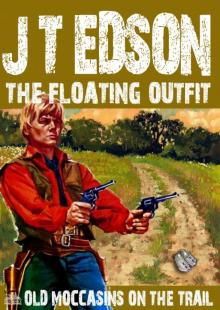 The Floating Outfit 48
The Floating Outfit 48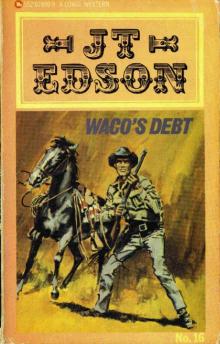 Wacos Debt
Wacos Debt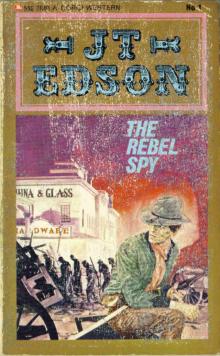 The Rebel Spy
The Rebel Spy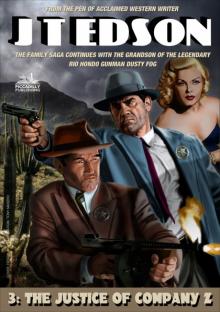 Cap Fog 3
Cap Fog 3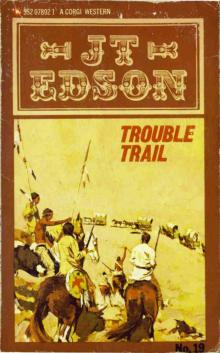 Trouble Trail
Trouble Trail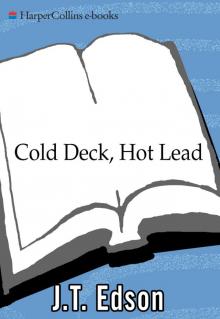 Cold Deck, Hot Lead
Cold Deck, Hot Lead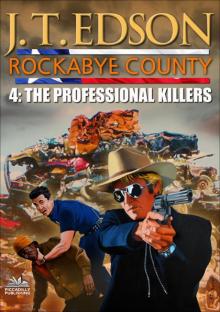 Rockabye County 4
Rockabye County 4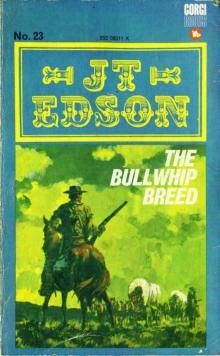 The Bullwhip Breed
The Bullwhip Breed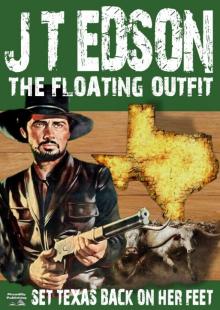 Set Texas Back On Her Feet (A Floating Outfit Western Book 6)
Set Texas Back On Her Feet (A Floating Outfit Western Book 6)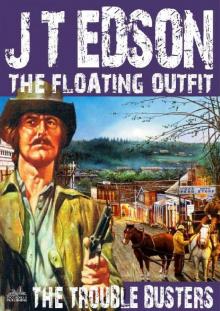 The Floating Outfit 25: The Trouble Busters (A Floating Outfit Western)
The Floating Outfit 25: The Trouble Busters (A Floating Outfit Western)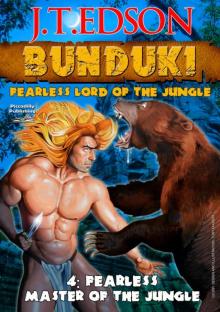 Fearless Master of the Jungle (A Bunduki Jungle Adventure
Fearless Master of the Jungle (A Bunduki Jungle Adventure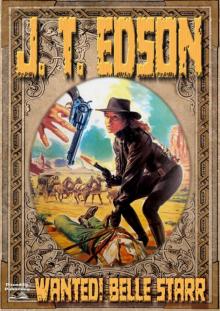 Wanted! Belle Starr!
Wanted! Belle Starr!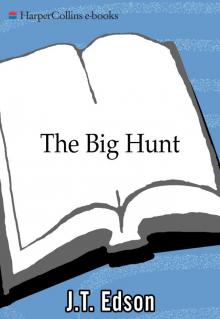 The Big Hunt
The Big Hunt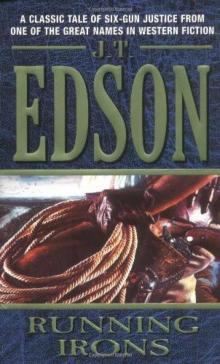 Running Irons
Running Irons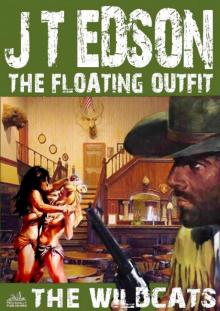 The Floating Outfit 19
The Floating Outfit 19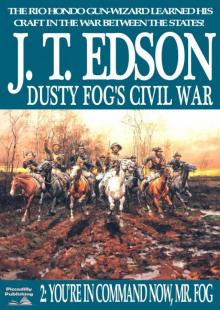 You're in Command Now, Mr Fog
You're in Command Now, Mr Fog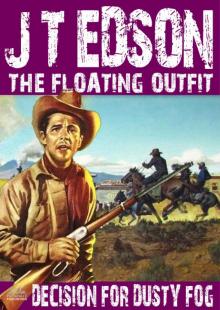 The Floating Outfit 27
The Floating Outfit 27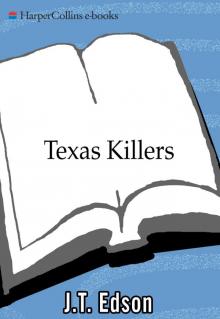 Texas Killers
Texas Killers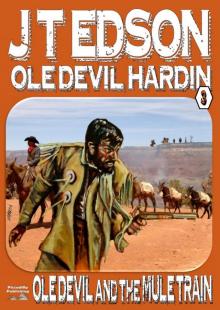 Ole Devil and the Mule Train (An Ole Devil Western Book 3)
Ole Devil and the Mule Train (An Ole Devil Western Book 3)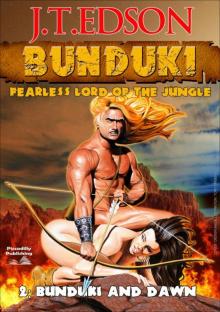 Bunduki and Dawn (A Bunduki Jungle Adventure Book 2)
Bunduki and Dawn (A Bunduki Jungle Adventure Book 2)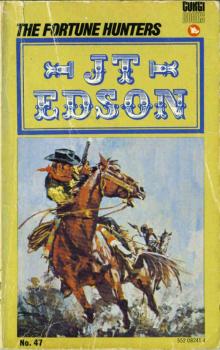 The Fortune Hunters
The Fortune Hunters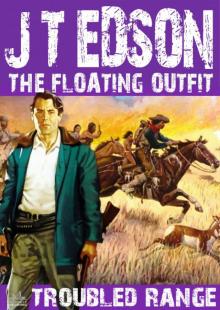 The Floating Outfit 12
The Floating Outfit 12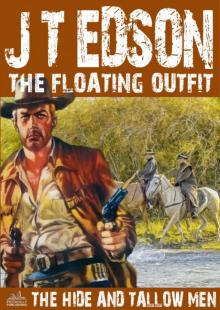 The Hide and Tallow Men (A Floating Outfit Western. Book 7)
The Hide and Tallow Men (A Floating Outfit Western. Book 7)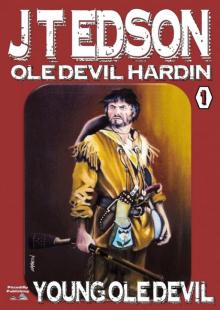 Young Ole Devil
Young Ole Devil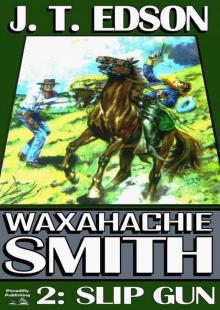 Slip Gun
Slip Gun The Drifter
The Drifter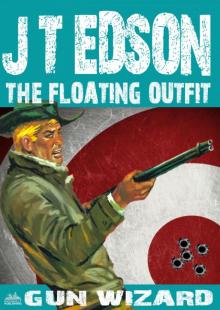 The Floating Outfit 45
The Floating Outfit 45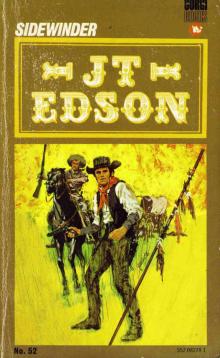 Sidewinder
Sidewinder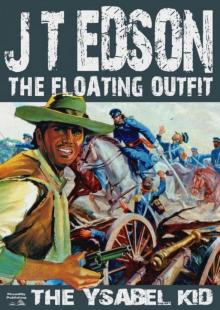 The Ysabel Kid
The Ysabel Kid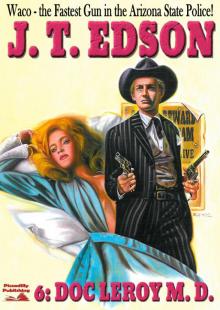 Waco 6
Waco 6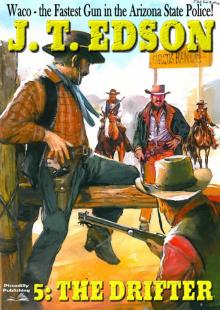 Waco 5
Waco 5 Point of Contact
Point of Contact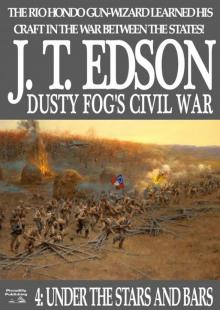 Under the Stars and Bars (A Dusty Fog Civil War Western Book 4)
Under the Stars and Bars (A Dusty Fog Civil War Western Book 4)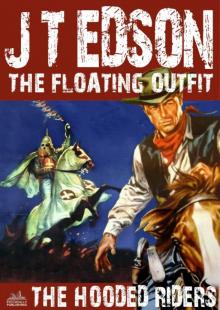 The Floating Outfit 9
The Floating Outfit 9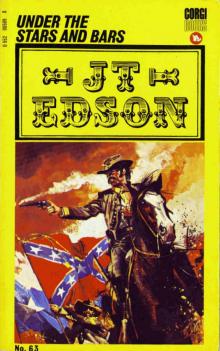 Under the Stars and Bars
Under the Stars and Bars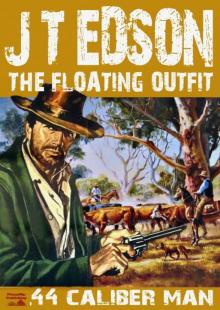 .44 Caliber Man
.44 Caliber Man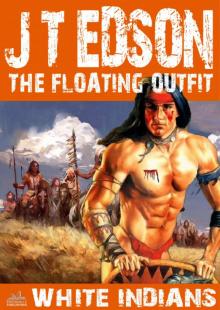 The Floating Outfit 17
The Floating Outfit 17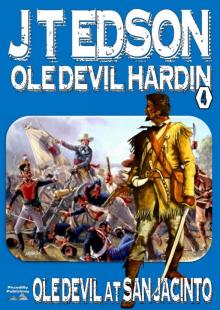 Ole Devil at San Jacinto (Old Devil Hardin Western Book 4)
Ole Devil at San Jacinto (Old Devil Hardin Western Book 4)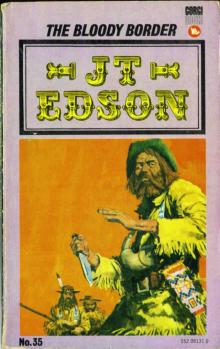 The Bloody Border
The Bloody Border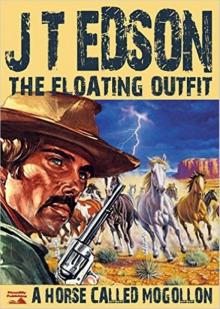 A Horse Called Mogollon (Floating Outfit Book 3)
A Horse Called Mogollon (Floating Outfit Book 3)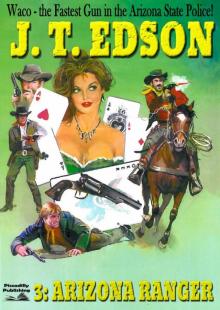 Waco 3
Waco 3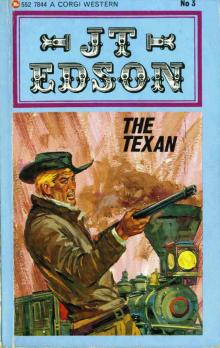 The Texan
The Texan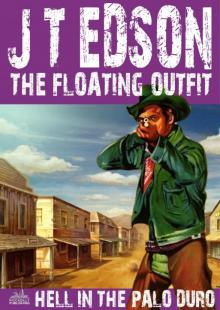 The Floating Outfit 35
The Floating Outfit 35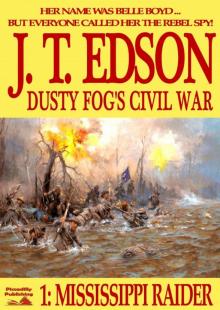 Mississippi Raider
Mississippi Raider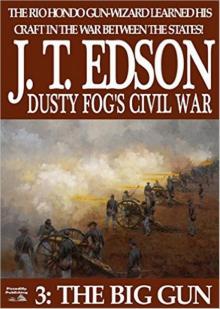 The Big Gun (Dusty Fog's Civil War Book 3)
The Big Gun (Dusty Fog's Civil War Book 3)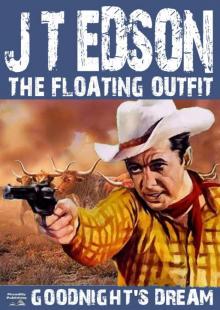 Goodnight's Dream (A Floating Outfit Western Book 4)
Goodnight's Dream (A Floating Outfit Western Book 4) Waco 4
Waco 4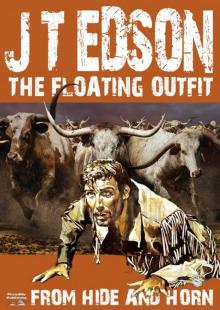 From Hide and Horn (A Floating Outfit Book Number 5)
From Hide and Horn (A Floating Outfit Book Number 5)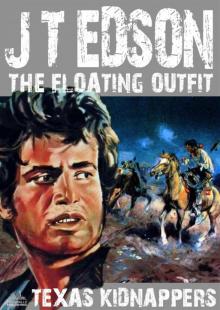 The Floating Outfit 18
The Floating Outfit 18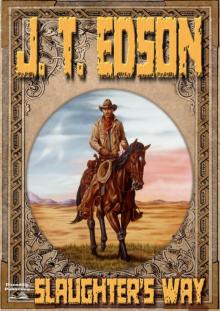 Slaughter's Way (A J.T. Edson Western)
Slaughter's Way (A J.T. Edson Western)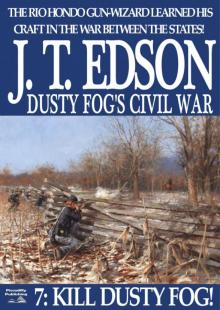 Dusty Fog's Civil War 7
Dusty Fog's Civil War 7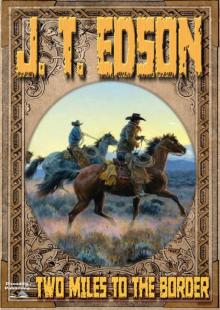 Two Miles to the Border (A J.T. Edson Western)
Two Miles to the Border (A J.T. Edson Western)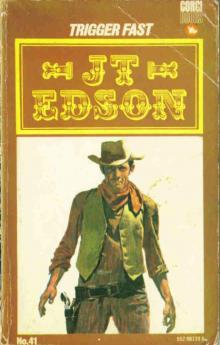 Trigger Fast
Trigger Fast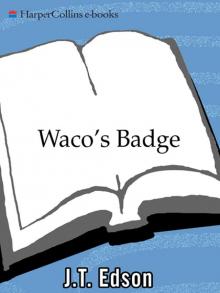 Waco's Badge
Waco's Badge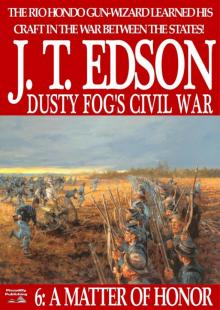 A Matter of Honor (Dusty Fog Civil War Book 6)
A Matter of Honor (Dusty Fog Civil War Book 6)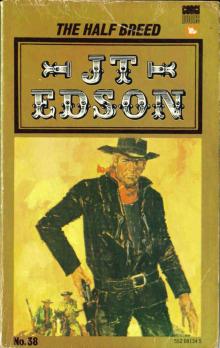 The Half Breed
The Half Breed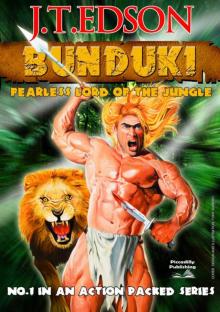 Bunduki (Bunduki Series Book One)
Bunduki (Bunduki Series Book One)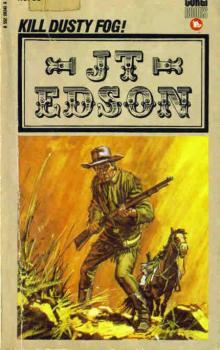 Kill Dusty Fog
Kill Dusty Fog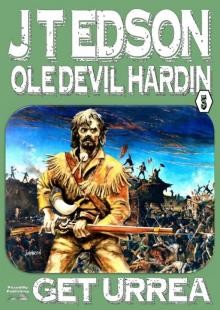 Get Urrea! (An Ole Devil Hardin Western Book 5)
Get Urrea! (An Ole Devil Hardin Western Book 5)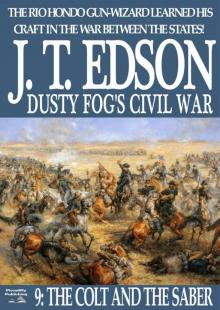 Dusty Fog's Civil War 9
Dusty Fog's Civil War 9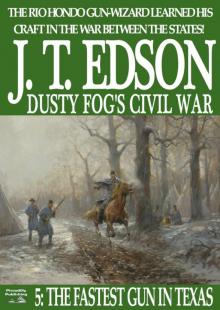 The Fastest Gun in Texas (A Dusty Fog Civil War Book 5)
The Fastest Gun in Texas (A Dusty Fog Civil War Book 5)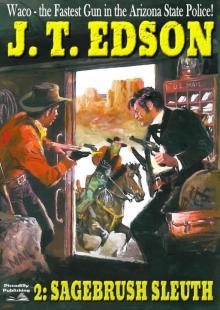 Sagebrush Sleuth (A Waco Western #2)
Sagebrush Sleuth (A Waco Western #2)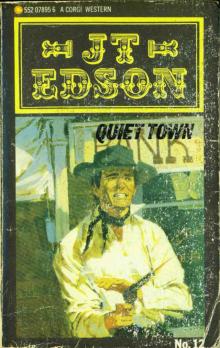 Quiet Town
Quiet Town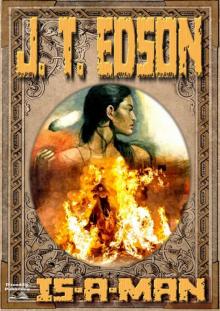 Is-A-Man (A J.T. Edson Standalone Western)
Is-A-Man (A J.T. Edson Standalone Western)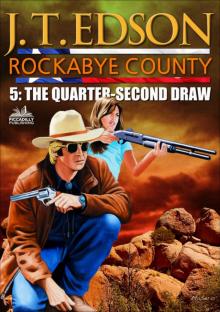 Rockabye County 5
Rockabye County 5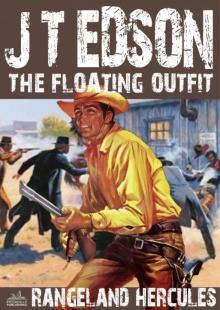 The Floating Outfit 14
The Floating Outfit 14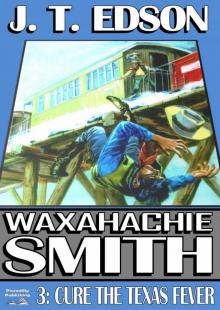 Cure the Texas Fever (A Waxahachie Smith Western--Book 3)
Cure the Texas Fever (A Waxahachie Smith Western--Book 3)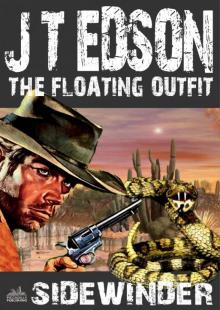 The Floating Outfit 13
The Floating Outfit 13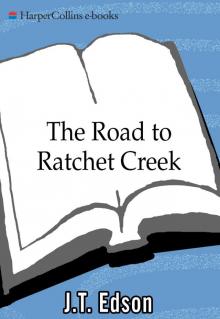 The Road to Ratchet Creek
The Road to Ratchet Creek